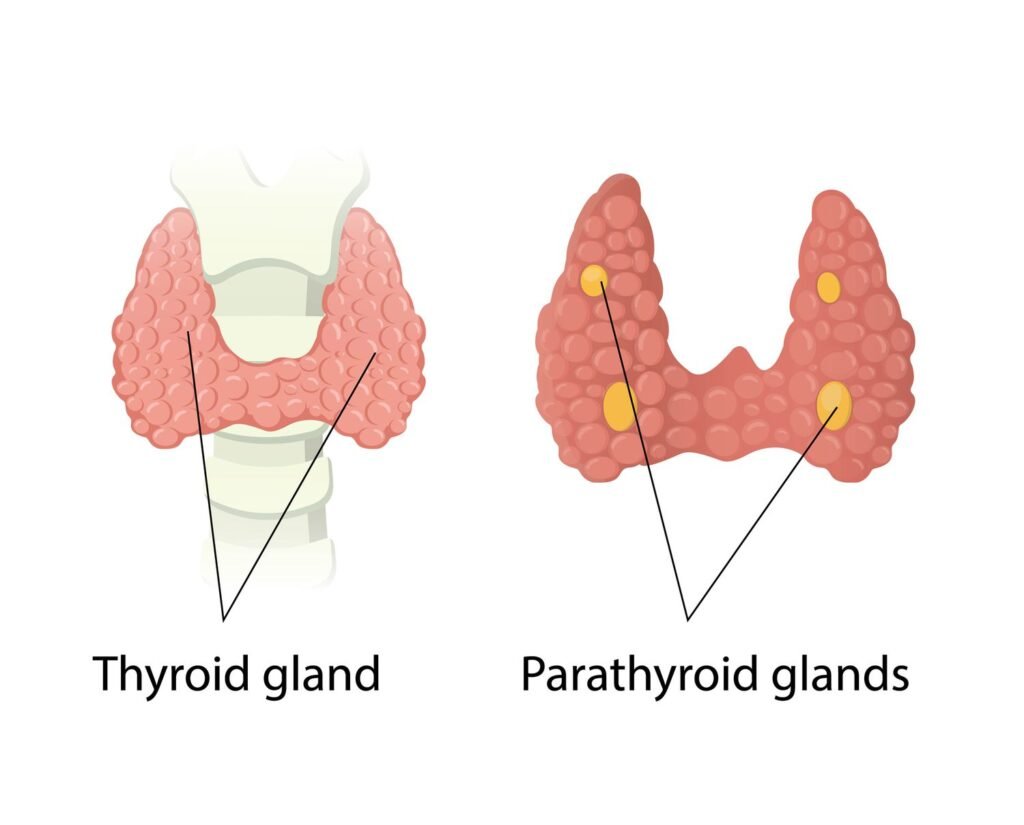Thyroid and Parathyroid Disorders
24+ years of experience 20,000+ patients treated. Insurance facilities are available for laparoscopic Thyroid and Parathyroid Disorders repair.
What are Thyroid and Parathyroid Disorders?
Thyroid and parathyroid disorders are conditions affecting the thyroid and parathyroid glands in the neck, which regulate vital body functions through hormone production. These disorders can disrupt metabolism, energy levels, and calcium balance, leading to various symptoms like fatigue, weight changes, and bone health issues. Effective management and treatment are essential for maintaining overall health.

Types of Thyroid and Parathyroid Disorders
Thyroid and parathyroid disorders encompass a range of conditions that can affect the thyroid gland’s ability to produce hormones properly. Here are the main types:
- 1.Hypothyroidism
- 2.Hyperthyroidism
- 3.Goiter
- 4.Thyroiditis
- 5.Thyroid Cancer
- 6.Hyperparathyroidism

Treatments for Thyroid and Parathyroid Disorders
Treating thyroid and parathyroid disorders involves various strategies tailored to the specific type and severity of the disorder. Here are the common treatments explained in simple terms:
Medication
Hypothyroidism: Usually treated with synthetic thyroid hormone levothyroxine, which helps to restore normal hormone levels and alleviate symptoms.
Hyperthyroidism: Medications like methimazole or propylthiouracil are used to reduce thyroid hormone production.
Radioactive Iodine Therapy: Often used for hyperthyroidism, this treatment involves taking radioactive iodine orally. The iodine destroys the overactive thyroid cells, which can lead to the thyroid becoming underactive, sometimes requiring lifelong hormone replacement.
Surgery
Thyroidectomy: A surgical procedure to remove part or all of the thyroid gland, typically used when other treatments fail or if there’s thyroid cancer.
Parathyroidectomy: The removal of one or more of the parathyroid glands, usually performed when hyperparathyroidism is present and causing significant health problems.
Dietary Management
Adjusting diet can help manage symptoms or improve treatment efficacy, particularly with iodine intake, which is crucial for thyroid health.
Calcium and Vitamin D Supplements: These are particularly useful in managing hypoparathyroidism, as they help maintain calcium levels in the blood, reducing symptoms like muscle cramps and spasms.
Hormone Replacement Therapy
For those who have undergone surgery that impacts hormone production, or for conditions like hypoparathyroidism where the parathyroid glands do not produce enough hormone, synthetic hormones may be prescribed to maintain normal body functions.
Monitoring and Regular Check-ups
Continuous monitoring of hormone levels and regular check-ups with healthcare providers are crucial to adjust treatments as needed and to manage these disorders effectively.
Each treatment aims to balance hormone levels in the body and alleviate symptoms to improve the quality of life for individuals with thyroid and parathyroid disorders.

Why Lux
Lux Hospital is renowned for its specialized care in treating Thyroid and Parathyroid disorders, offering advanced diagnostic tools and personalized treatment plans. With a team of expert endocrinologists and state-of-the-art medical technology, the hospital ensures comprehensive and effective care for all patients. Lux Hospital also emphasizes patient education and follow-up, supporting patients throughout their treatment journey for optimal health outcomes.
Diagnosis of Thyroid and Parathyroid Disorders
Diagnosing thyroid and parathyroid disorders involves several steps and tests to accurately assess the function of these glands. Here’s a detailed look at the common diagnostic methods:
Blood Tests: The most common diagnostic tool, blood tests measure the levels of thyroid hormones such as Thyroxine (T4) and Triiodothyronine (T3), as well as Thyroid Stimulating Hormone (TSH) which is produced by the pituitary gland. For parathyroid disorders, blood tests focus on calcium and parathyroid hormone (PTH) levels.
Ultrasound: This imaging test uses sound waves to create pictures of the thyroid gland and can detect abnormalities like nodules or cysts in the thyroid tissue. It’s non-invasive and helps in further assessing any physical changes observed in the gland.
Radioactive Iodine Uptake Test: Used primarily for diagnosing hyperthyroidism, this test measures how much radioactive iodine is absorbed by the thyroid gland from the bloodstream, providing insights into its functioning and identifying issues like overactivity.
Fine-Needle Aspiration Biopsy: If nodules or abnormalities are detected in the thyroid, a fine-needle aspiration biopsy may be performed. This involves using a thin needle to remove a small sample of thyroid tissue, which is then examined under a microscope to check for cancer cells.
CT or MRI Scans: Although less commonly used for thyroid disorders, these imaging tests can help visualize the size and location of the thyroid and parathyroid glands, especially if a tumor or significant structural issue is suspected.
Parathyroid Sestamibi Scan: A specialized scan used to locate a parathyroid adenoma, which is a common cause of hyperparathyroidism. It involves injecting a small amount of radioactive substance and taking pictures as it accumulates in the parathyroid glands.
These diagnostic tools are crucial for determining the specific type of thyroid or parathyroid disorder, guiding the subsequent treatment approach effectively.

Causes of Thyroid and Parathyroid Disorders
Thyroid and parathyroid disorders can stem from a variety of factors that disrupt the normal functioning of these glands. Here are the primary causes:
- Autoimmune Diseases: The most common cause of thyroid disorders like Hashimoto’s thyroiditis (leading to hypothyroidism) and Graves’ disease (resulting in hyperthyroidism) is the immune system mistakenly attacking the thyroid gland.
- Iodine Imbalance:Both too much and too little iodine in the diet can lead to thyroid problems. Iodine is essential for thyroid hormone production, and an imbalance can significantly affect this process.
- Genetic Factors: Some people inherit a tendency to develop thyroid and parathyroid diseases, which can manifest at any point in their lives.
- Tumors: Both benign and malignant tumors on the thyroid or parathyroid glands can affect their function. For instance, benign tumors might cause the parathyroid glands to produce too much hormone, leading to hyperparathyroidism.
- Radiation Exposure: Exposure to radiation, particularly in the neck area, can increase the risk of developing thyroid cancer or other thyroid-related issues.
- Surgical Removal or Injury: Surgery that involves the removal or injury of the thyroid or parathyroid glands can lead to disorders. For example, accidental removal of parathyroid glands during thyroid surgery can result in hypoparathyroidism.
Understanding these causes is crucial for preventing and managing thyroid and parathyroid disorders effectively.
Symptoms of Thyroid and Parathyroid Disorders
Thyroid and parathyroid disorders manifest a range of symptoms, influenced by whether the gland is underactive or overactive. Here are the key symptoms for each condition:
Thyroid Disorders:
- Hypothyroidism: Fatigue, weight gain, dry skin, cold intolerance, constipation, depression, and slow heart rate.
- Hyperthyroidism: Weight loss, rapid heartbeat, anxiety, tremors, heat intolerance, increased sweating, and sleep issues.
Parathyroid Disorders:
- Hyperparathyroidism: Weak bones, kidney stones, excessive urination, abdominal pain, depression, and muscle weakness.
- Hypoparathyroidism: Muscle cramps, tingling sensations in fingers or around the mouth, dry skin, brittle nails, and, occasionally, seizures.
These symptoms can significantly impact quality of life and require appropriate medical attention to manage effectively.
Tips to Prevent Thyroid and Parathyroid Disorders
While not all thyroid and parathyroid disorders can be prevented, especially those caused by genetic factors, there are measures that can reduce the risk or help manage the conditions more effectively:
Maintain a Balanced Diet: Ensure your diet includes adequate levels of iodine, which is crucial for thyroid health. Foods rich in iodine include seafood, dairy products, and iodized salt.
Regular Exercise: Staying active helps maintain a healthy weight and overall health, which can positively influence thyroid function.
Avoid Excessive Intake of Goitrogens: Foods like soy products, cabbage, and broccoli can interfere with thyroid hormone production if consumed in large quantities, especially when iodine levels are low.
Monitor Your Health: Regular check-ups with your doctor can catch thyroid and parathyroid issues early. This is particularly important if you have a family history of these disorders.
Limit Radiation Exposure: Minimize exposure to excessive radiation, especially in the neck area, to reduce the risk of thyroid cancer.
Calcium and Vitamin D: Adequate intake of calcium and vitamin D supports parathyroid health and overall bone density, helping to prevent related disorders.
These proactive steps can help maintain the health of your thyroid and parathyroid glands and reduce the risk of developing related disorders.
Conclusion
Understanding and managing thyroid and parathyroid disorders are crucial for maintaining overall well-being. By recognizing the symptoms early and adopting preventive measures, you can effectively safeguard your glandular health. Don’t hesitate to consult healthcare professionals at Lux Hospital for expert guidance and treatment options tailored to your needs. Schedule your appointment today to ensure your thyroid and parathyroid glands are functioning optimally!
Excellence in Patient Care
We are proud to provide exceptional support to our patients, ensuring they receive the highest quality care and attention. Our award-winning services include:
End to End Patient Care from Lux.
Experienced Medical Staff
Patient-Centered Services
Trusted Health Solutions

Find a Doctor
Expertise you can trust, Meet our esteemed doctors who bring exceptional knowledge, compassion, and innovation to provide top-notch care for your health and well-being.

Dr. Abhishek
MBBS, MS, FMAS, FISCP, DMAS
Consultant Colorectal & Laparoscopic Surgeon, Proctologist
Experience : 25 years

Dr. Samhitha
MBBS, MS, FMAS, FISCP, DMAS
Consultant Colorectal & Laparoscopic Surgeon, Proctologist
Experience : 7 years
What Are People Saying About Us in Google
Embark on a journey of inspiration and hope with our patient success stories, complemented by informative videos from our dedicated doctors.










